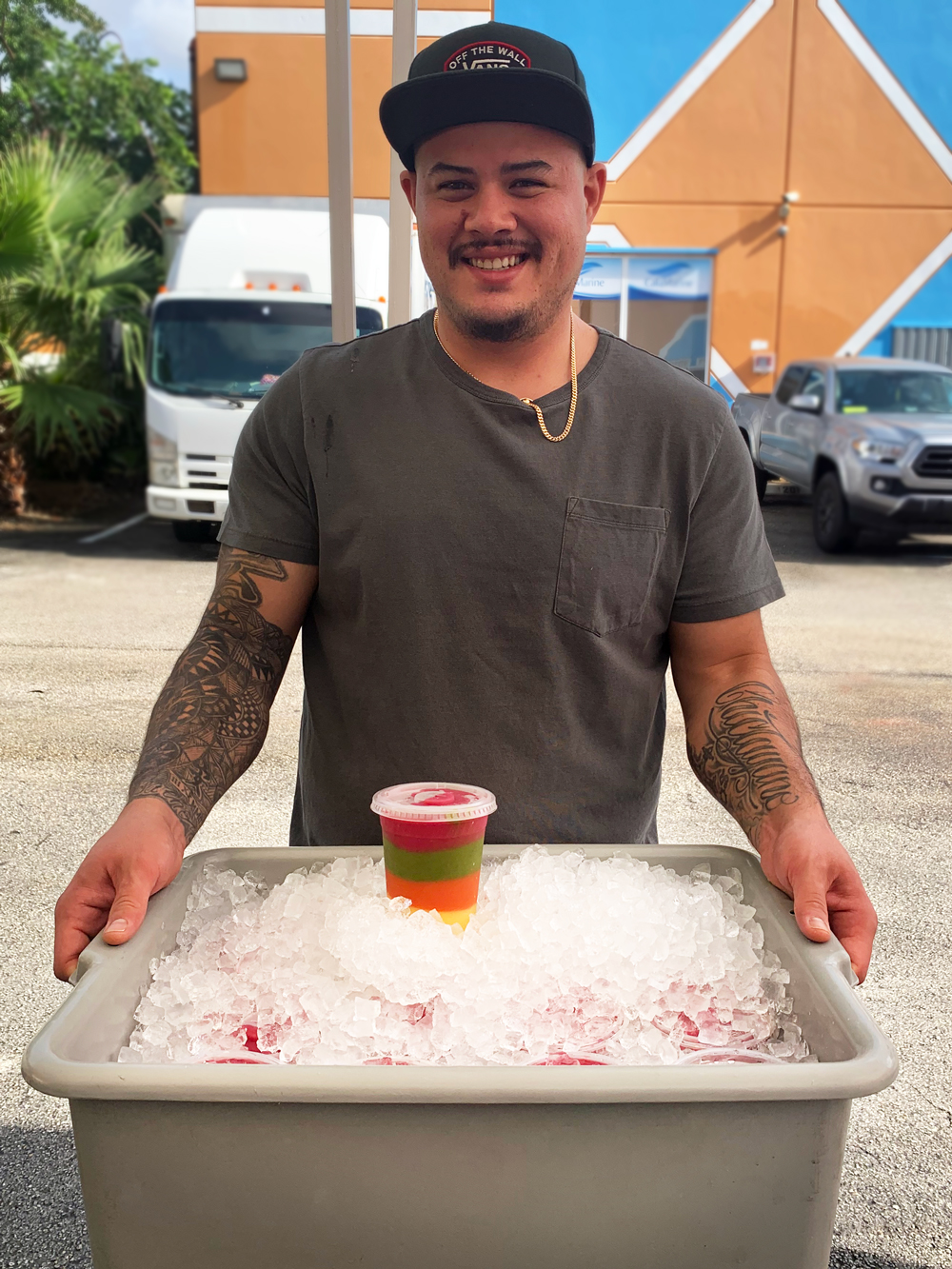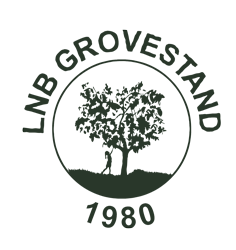
Nando
Name:
Nando
In what part of town do you live?
I live in North Miami.
How long have you lived in the area?
Since 2001.
What brought you to town?
I was born and raised in Chiclayo, Peru, which is a Northern coastal town in the Lambayeque region. My dad moved here in 1998 and established himself. When he got his own place, my sister and I immigrated.
What stands out amongst your first impressions of Miami?
The highways. I had never seen a highway this wide and this clean. The highway that crosses all of Peru is one-way on each side. I remember when we got out of the airport, the first thing that hit me was, whoa – it’s like a whole new world.
What stands out from your childhood in Peru?
I have a lot of vivid memories. I grew up with my grandparents. I was a little bit of a troublemaker when I was young. So, my grandma found me a job when I was 10. A friend of the family had a ‘polleria,’ a chicken rotisserie place. I worked the cashier. Then, I would peel potatoes in the kitchen over the weekend. I think back on those memories as my introduction to the hospitality industry.
Do you remember it being fun?
Oh yeah, absolutely. I remember music as a big part of that specific kitchen. The chef would come in and he would start playing music. Then, I could hear the other cooks come in and then they would start prepping. Then the chef would start dancing. It was just a chicken rotisserie joint, so there wasn’t a lot of seriousness in the kitchen. He introduced me to the kitchen and would explain to me what he was doing. I always felt comfortable in the kitchen and I’m a very anxious person.
What are you doing now?
I am the sushi chef at Itamae, a family-owned restaurant. We specialize in Peruvian Japanese food. I oversee pretty much the operation from the kitchen to the outside. Our service director, Shannon, is the front of the house manager and really our service director. We haven’t been able to hire other managers, so right now she’s doing everything. She’s a superhero. In the back we have two Chef de cuisines. The four of us really run Itamae.
What does ‘kitchen to the outside’ entail?
A general manager would be a whole operation, but not necessarily to be stuck in the kitchen for 70 hours a week. Because we’re a family restaurant, we can structure ourselves a little bit different. At this point in my life, I am still enjoying the everyday as a cook. I haven’t necessarily pulled away from the kitchen, as most operators would, when you have the kind of talent that you have in the kitchen. You would kind of let them run on their own and handle other things.
Is music still part of the kitchen?
In the kitchen yes, but only to get us going. But not anymore in a personal sense.
Personal sense?
I attempted to have a career in the music industry. When I came to the US I fell in love with hip hop. When I graduated high school, I got signed, we put out a couple of records, but I was very uncomfortable in the music industry with the idea of somebody telling me to portray something I’m not. They were like, ‘we want to do a music video ‘narco-style’, portraying Colombian drug dealers or whatnot, and I was just like, no I can’t. My dad is a public figure. I cannot even insinuate that I did those things. It doesn’t matter how important it would be for my career or how many doors could open to it, I’m not comfortable with that.
Your dad is now part of the restaurant. What role does he play at Itamae?
He’s the boss. He oversees us all. My dad usually makes the last decisions on anything that we need.
Walk us through your workday at Itamae?
I’ll come into the restaurant right around 8:00 AM and start receiving fish around 8:15 all the way through 11:00 AM. Then I will get on butchery. Everyday around 11, we will sit down together, the whole kitchen and front of the house and have breakfast together. Around noon we get ready for service. We’re operating five days a week right now. Obviously, we have a lot of staff shortages like anybody else in the country.
How did you learn sushi?
I learned sushi through my dad. When we first came to the states, my dad would do kosher sushi catering on the weekend. Aside from his 40-hour job, he was always looking for opportunities to make extra income. My dad taught us to make our own money and not necessarily depend on him to provide. He would say, ‘you work a full day’ and then he would give you 150 bucks. And then say – ‘those shoes that you’ve been asking me about, if they’re $200, you only need to work two days and you’ll have those shoes.’ My dad taught himself how to make sushi. When he came to the states, he got a job as a busser in a restaurant that’s still standing today, called Matsuri. It’s one of the OG spots in Miami.
At some point they started pulling my dad to the front, even if he wasn’t making rolls, just to do some prep, because my dad being Asian physically brought some authenticity to the sushi counter. Obviously in a Japanese tradition, they were teaching my dad very slowly, like one thing at a time. My dad was like, I’m in my thirties and I have two young kids that I’m trying to bring from Peru. So I’m not going to have time for this. So, my dad started buying his own things at the Japanese market to practice himself and do catering on the weekends. That’s how my dad got good at it. Who doesn’t want a little sushi party? Eventually, once he got good, the price went up.
What’s it like working with your dad?
It’s amazing. I’m very grateful. It hasn’t always been easy. We have two very different styles. The first generation of immigrants are always more concerned with stability. I think my dad’s focus was on learning how to make sushi to provide for us. I had the luxury of looking at sushi but saying ‘I want to perfect this craft.’ Now it’s very easy because we have much better communication. My dad no longer feels the pressure of having to work in the kitchen 70 hours a week. He’s really become that extra set of hands in the kitchen.
A lot of restaurants and chefs often tell us they want to use fruit from our farm but run into issues, whether it’s picking up the fruit, adapting to what’s in season that week, or willingness to wait for fruit to ripen. Itamae is making it work, coming each Saturday to pick up produce at the Drive Through. Why do you think you are able to make it work?
Chef Tere. Chef Terresa has had her eyes on using more local ingredients since we reopened in November. A lot of the fruits that we pick up, like the starfruit, are for her two desserts. She rotates the flavor of the granita. Now we’re going to use Florida avocados, which is something that quietly we’ve always wanted to do but have never really had the chutzpah. This is now becoming our system, where we’re going to figure out what you guys have available for the week and that is exactly what we’re going to pick for our dishes. I think it shows who we are and obviously who we want to become.
Last time you also picked up 14 rainbows to bring back to the kitchen. How was that received?
I committed the mistake the first time when I pulled up and somebody said ‘you only got a smoothie for yourself? I was like, ‘Got it.’ Obviously, everybody talks so much about these smoothies, I figured it’d be nice to pull up the next time with a smoothie for everybody. Let me tell you, you guys should be closer to the Design District. We would have one every day. Also – the bagels are sooo good.
Would you share any favorite local restaurants or places that you like?
I have so many good friends in this industry, and I know I’m just going to get it. But, oh well.
My favorite restaurant to go to right now is a Jaguar Sun. I love what they do with the limited amount of space they have. I have a tremendous respect for Chef Carey and Will, I think they provide one of the best experiences in Miami. Another favorite place is Ariete, I love what Mike does. I love his commitment to excellence. I love NIU kitchen. Also, La Mar. I know we do something similar with Peruvian food. But, because we don’t have a kitchen, whenever I’m missing good Peruvian hot dishes, it’s my favorite place to go. I think Diego is always pushing the boundary on Peruvian food.
What is Miami’s best kept secret?
I would say our local products, especially our local fishes. We export so much over local fish because most restaurants in Miami don’t use it. I never understand why I see Branzino on a menu. It comes frozen. Why aren’t you doing snappers? I don’t understand.
What for you is a worthy splurge?
Chef Knives. I would like to get a set of Nenohi knives.
What community or philanthropic groups are important to you that you might like to promote or share?
We could create a group now – a group to support local.
Is there a question would you like to ask us?
(NC) How hard would it be for you guys to grow something that I could bring seeds in from Peru? It’s called Ice Cream Bean. It grows in a tropical climate.
(A+W) We love it too. We are growing it already at our farms in Belize, and we are starting trees here as well. Interested to see what you want to do with it!
What question, challenge, or words of advice would you like to pose to the community?
(NC) What is so attractive about the word ‘white fish’ on a menu?
Related Posts
Leave a Reply Cancel reply
You must be logged in to post a comment.



